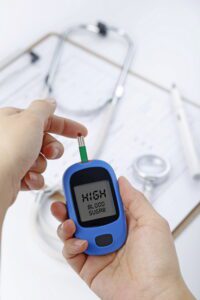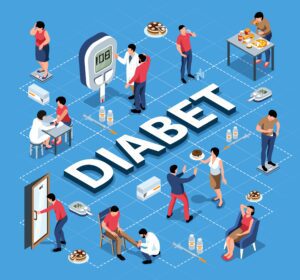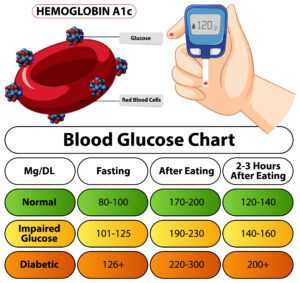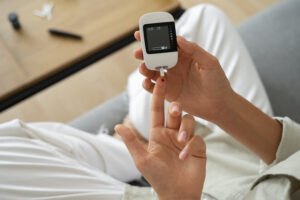Ensure diabetes care starts here—and it begins with clear, easy-to-understand information. Living with diabetes might seem overwhelming, but breaking it down into manageable pieces helps. This guide explains what diabetes is, its types, common symptoms, and how it affects daily life—so you can take pleasant, confident steps toward caring for your health.
Whether you’re facing diabetes yourself or supporting a loved one, this guide gives you friendly, practical insights. You’ll learn about diabetes prevention, managing day-to-day life, recognizing warning signs, and building habits that support long-term well-being. Let’s dive in.
Table of Contents
ToggleWhat is Diabetes & How to Ensure diabetes care?
At its heart, diabetes is a condition where sugar (glucose) isn’t processed properly in the body. Normally, your pancreas releases insulin—a hormone that tells your cells to absorb sugar for energy. If there’s not enough insulin, or your cells ignore it, sugar builds up in your bloodstream.
This isn’t just a one-time problem. Over months and years, high blood sugar can damage organs and systems including the eyes, kidneys, blood vessels, nerves, and heart. Understanding this is the first step toward managing—and preventing—serious complications.

Why Understanding Diabetes Matters
Diabetes can feel overwhelming if you only hear medical terms like “insulin resistance” or “glucose monitoring.” But it doesn’t have to be complex. Taking care of your health starts with understanding your body’s signals and how balance makes a difference. If you—or someone you care about—are navigating diabetes, this guide equips you to ensure diabetes care by arming you with clear insights and practical steps.
Types of Diabetes Explained
There are several types of diabetes, each with different causes and management strategies:
Type 1 Diabetes
- The pancreas stops producing insulin, often in childhood or adolescence.
- Requires daily insulin.
Type 2 Diabetes
- Body resists insulin or produces too little.
- Often linked to lifestyle, genetics, and age.
- Can often be delayed or reversed with healthy habits.
Gestational Diabetes
- Appears during pregnancy, often resolving afterward.
- Increases future risk of Type 2 for both mother and child.
Prediabetes (IFG/IGT)
- Blood sugar is higher than normal but not high enough for diabetes.
- Can often be reversed through diet and exercise.
Knowing which types of diabetes you or a loved one has helps tailor the right care plan and empowers you to ensure diabetes care effectively.
Spotting the Diabetes Symptoms
Symptoms of diabetes can vary in intensity and may develop slowly. Be aware of signs like:
- Constant thirst.
- Frequent urination.
- Unusual fatigue.
- Blurry vision.
- Slow-healing wounds.
- Unexplained weight loss.
- Numbness or tingling in hands and feet.
These diabetes symptoms are signals from your body. Don’t ignore them. Early detection makes a big difference—empowering you to take action and ensure diabetes care before complications arise.

The Risks of Untreated Diabetes
Unchecked high blood sugar slowly damages small blood vessels, affecting key organs. Your heart and blood vessels face increased risk of heart attack and stroke. Tiny vessels in your eyes can weaken, threatening your vision. Kidneys, which filter waste from your blood, can fail under constant sugar damage. Nerve damage in your feet and legs may cause pain, numbness, or infections that won’t heal easily—and in severe cases, it may require amputation.
Diabetes also impacts mental and emotional health: anxiety, depression, and difficulty coping are more common among people living with this condition. The good news is that diabetes isn’t meant to frighten you—it’s meant to prompt action, ensuring you can manage your health before it becomes overwhelming.
High blood sugar can harm tissues and organs in many ways. For instance:
- Damaged blood vessels increase risk of heart attack or stroke.
- Retinal damage can lead to blindness.
- Kidney stress can progress to failure.
- Nerve damage can cause pain, infections, or loss of sensation in the feet.
- Mental health may suffer—stress, anxiety, even depression.
Acknowledging these risks isn’t about fear—it’s about motivation. Knowing what’s at stake drives the power to ensure diabetes care with purpose.
Care In Case of Diabetes
How Diabetes is Diagnosed
Doctors use a few key blood tests to confirm diabetes or prediabetes:
- Fasting blood glucose: sugar measured after no food for 8 hours.
- Random blood glucose: measured anytime.
- HbA1c (A1c test): average blood sugar over 2–3 months.
A random blood glucose test—taken regardless of when you last ate—can signal immediate problems. A HbA1c test, also called A1c, gives your average blood sugar level over the previous two to three months. A reading under 5.7% is considered normal, 5.7–6.4% suggests prediabetes, and 6.5% or above confirms diabetes.
Levels are interpreted as:
- Under 5.7% – normal.
- 5.7–6.4% – prediabetes.
- 6.5% or higher – diabetes.
These numbers become your roadmap to symptom awareness and long-term management, helping you to care in diabetes symptoms.

Daily Lifestyle Changes to Ensure Diabetes Care
You don’t need drastic transformation. Effective diabetes care is about sustainable routines:
- Movement is powerful medicine. Aim for at least 150 minutes of moderate activity each week: brisk walks, cycling, gardening, dancing—anything that gets your heart pumping. Exercise improves insulin efficiency and lowers blood sugar naturally.
- Eating thoughtfully doesn’t mean deprivation, but balance. Imagine your plate divided into sections: half filled with colorful vegetables, a quarter with lean proteins, and a quarter with whole grains. Add a small portion of healthy fat like olive oil, nuts, or avocado. Avoid sugary drinks and processed foods, but remember that treats are ok—just not daily staples.
- Maintaining a healthy weight is crucial. Even modest weight loss—just 5–7% of your body weight—can significantly reduce the risk of diabetes or its complications. Focus on progress, not perfection, and celebrate small achievements.
These steps ground your daily life in practical habits designed to ensure diabetes care naturally and consistently.
When Medication Steps In
Lifestyle changes are foundational, but medications often support your body’s ability to manage blood sugar:
- Metformin: A first-choice oral medication that reduces sugar production in the liver.
- Additional medications: Include SGLT‑2 inhibitors or sulfonylureas as needed.
- Insulin injections or pumps: Critical for Type 1 diabetes and sometimes included in Type 2 diabetes care, especially if lifestyle changes aren’t enough.
Doctors choose your regimen based on your health profile. Taking medicines as prescribed helps you stay on course to ensure diabetes care effectively.
Monitoring Blood Sugar: Ensure Diabetes Care
Tracking your blood sugar gives you real-time insight into how your diet, exercise, and medications are working. Tools include finger-prick glucometers and continuous glucose monitors (CGMs).
Monitor:
- Before and after meals,
- When diabetes symptoms arise,
- At consistent daily times.
Write or log these numbers. Insights into trending highs or lows help refine your plan and underpin your efforts to ensure diabetes care with clarity.

Preventing Complications Through Routine Checkups
Good diabetes care extends beyond daily life to periodic screenings:
- Dilated eye exam (yearly) protects vision.
- Kidney function tests catch early damage.
- Foot exams prevent serious infections.
- Cholesterol and blood pressure checks support heart health.
- Dental checkups manage gum and oral health.
These screenings are proactive steps to ensure diabetes care before complications take hold.
Thriving with Diabetes in Everyday Life
Diagnosis doesn’t mean deprivation—it’s a chance to make intentional, healthful choices:
- When dining out, prioritize vegetables and lean proteins, and skip sugary drinks. You don’t have to avoid treats—just savor them occasionally with awareness.
- Stress impacts blood sugar—so turn to deep breathing or breaks to recalibrate.
- And don’t forget sleep: poor rest can unbalance your blood sugar. Remember, mental health matters too. Reach out to friends or professionals when life feels heavy.
These habits aren’t rules—they’re tools that empower you to ensure diabetes care while living fully and joyfully.
Pregnancy and Diabetes
Diabetes during pregnancy requires special attention. If you’re pregnant, blood sugar balance matters for both you and your baby. Gestational diabetes generally improves after birth, but it signals a need for sustained healthy choices to support lifelong wellness.
Type 2 diabetes is showing up in younger people now more than ever. Starting healthy habits early—colorful plates, active play, checkups—sets a lifetime foundation for ensuring diabetes care across generations.
Early Habits for Young People
Type 2 diabetes is appearing more often in younger individuals. Families can make a difference by:
- Offering balanced meals with fruits and vegetables.
- Encouraging active play and reducing screen time.
- Ensuring regular health screenings.
These gentle shifts help young ones build habits to ensure diabetes care from the very start.
When to Take Immediate Action
Noticing signs like sudden confusion, fainting, heavy breathing, chest pain, or red, infected wounds? Seek medical help immediately. These could be signs of serious complications like diabetic ketoacidosis (DKA) or infection—time matters in these moments.
Certain red flags demand urgent attention:
- Confusion, fainting, heavy breathing.
- Chest pains or fast heartbeat.
- Persistent vomiting or dehydration.
- Swollen, red, or infected wounds.
These may signal serious conditions like ketoacidosis or infection. Don’t hesitate—seek medical help immediately to protect your health.
Building a Supportive Diabetes Team
No one needs to face diabetes alone. A well-rounded support network includes:
- A primary doctor or endocrinologist.
- A dietitian or diabetes educator.
- Eye, foot, and dental specialists.
- Mental health support.
- Family and friends.
Together, they form a safety net that helps you ensure diabetes care, every day and in every situation.
Real-Life Success Stories
Many individuals have lowered their A1c counts, improved energy levels, and avoided major complications by adopting balanced meals, regular activity, consistent monitoring, and smart medical care. These stories aren’t rare—they’re proof that small changes lead to meaningful, lasting results.
Final Words: Your Journey to Better Health
Ensure diabetes care isn’t a one-time action—it’s a daily choice. Start with small steps: a veggie-packed dinner, a midday walk, a scheduled check-up. Celebrate each positive change.
If your tests come out normal, keep those habits. If diabetes shows up, remember: it’s manageable. Day by day, you can steward your health, enjoy food, movement, and meaningful connections.
Living with diabetes doesn’t mean surrender—it means showing up every day with the clarity, intention, and care that lets you flourish.
Call-to-Action
Looking for more tips to ensure diabetes care, understand nutrition, and live healthier every day? Explore the Health & Well-Being section on Healthy Gen Code (HGC) for simple, science-backed advice to support your journey. Contact us here & help us grow with kindness.
Ensure diabetes care – Frequently Asked Questions
1. What is diabetes?
Diabetes is a chronic condition where the body doesn’t properly use or produce insulin, leading to high blood sugar levels.
2. What are the main types of diabetes?
There are three main types: Type 1, Type 2, and Gestational Diabetes (during pregnancy). Each affects blood sugar differently.
3. What causes diabetes?
Causes include genetics, autoimmune reactions (Type 1), poor lifestyle habits (Type 2), and hormonal changes during pregnancy (gestational).
4. How common is diabetes?
Globally, over 830 million people live with diabetes, with cases rising especially in low- and middle-income countries.
5. What are early signs of diabetes?
Diabetes symptoms include increased thirst, frequent urination, fatigue, weight loss, and blurry vision.
6. Can diabetes be prevented?
Yes. A healthy diet, regular exercise, and weight management can ensure diabetes care and reduce the risk of Type 2 diabetes.
7. How is diabetes diagnosed?
Through blood tests such as fasting glucose, random glucose, and HbA1c (which shows average sugar levels over 2–3 months).
8. Is diabetes curable?
Diabetes is not curable, but it is manageable. Type 2 can sometimes be reversed with lifestyle changes.
9. What is insulin?
Insulin is a hormone that helps cells absorb glucose. It’s essential for managing blood sugar.
10. Do all diabetics need insulin?
Type 1 diabetics always need insulin. Some Type 2 diabetics may also require it depending on their condition.
11. What foods should be avoided?
Limit sugary drinks, refined carbs, saturated fats, and processed snacks to help manage blood sugar.
12. Can exercise help?
Absolutely. Physical activity improves insulin sensitivity and helps control blood sugar levels.
13. What’s a healthy A1c level?
An A1c below 5.7% is normal. Diabetics should aim to stay below 7%, as advised by their doctor.
14. Is diabetes dangerous?
Yes, if uncontrolled. It can lead to heart disease, kidney failure, blindness, and nerve damage.
15. Can children get diabetes?
Yes. Type 1 usually appears in childhood, but Type 2 is also increasing among youth.
16. What is gestational diabetes?
It’s diabetes during pregnancy, which usually resolves after delivery but raises future Type 2 risk.
17. Can stress affect blood sugar?
Yes. Chronic stress can raise blood sugar and make diabetes harder to manage.
18. How often should I check blood sugar?
It depends on your treatment. Your doctor will guide you based on your individual needs.
19. Why is foot care important in diabetes?
Poor circulation and nerve damage increase the risk of infections and amputations. Regular foot exams help prevent this.
20. How do I ensure diabetes care daily?
Eat balanced meals, stay active, monitor sugar levels, take medications properly, and get regular checkups.
Sources
- https://www.mayoclinic.org/diseases-conditions/diabetes/symptoms-causes/syc-20371444
- https://www.cdc.gov/diabetes/about/index.html
- https://my.clevelandclinic.org/health/diseases/7104-diabetes
- https://www.niddk.nih.gov/health-information/diabetes/overview/what-is-diabetes
Referral
- Get off using https://hostinger.in?REFERRALCODE=HGC
- Get off using the link here for buying Premium Web Hosting at Hostingrer https://cart.hostinger.com/pay/de220648-48ab-4d33-9c23-477a6764af14
- Get off using the link here for buying Cloud Startup at Hostingrer https://cart.hostinger.com/pay/fecdf014-ea49-431b-913a-88f30fe1db42

